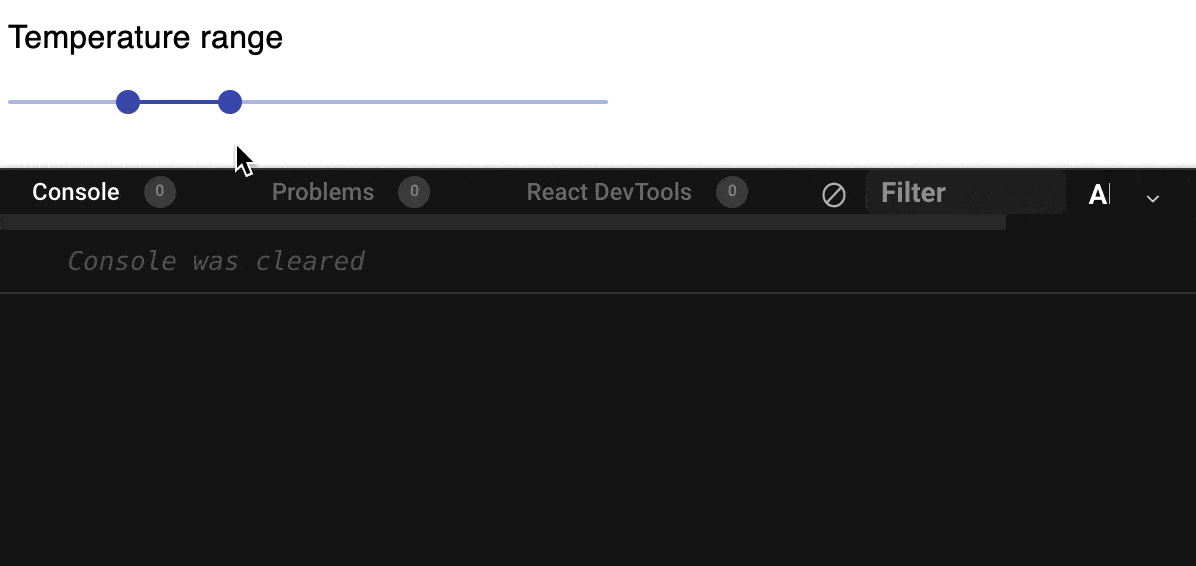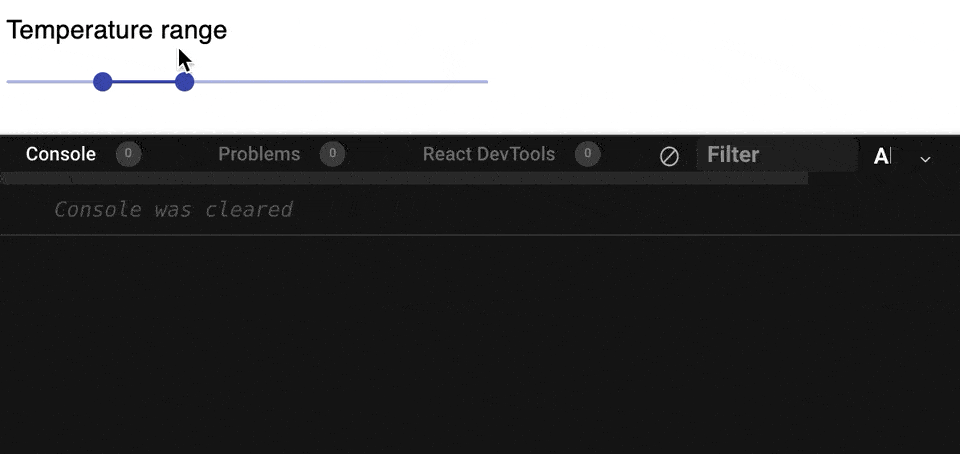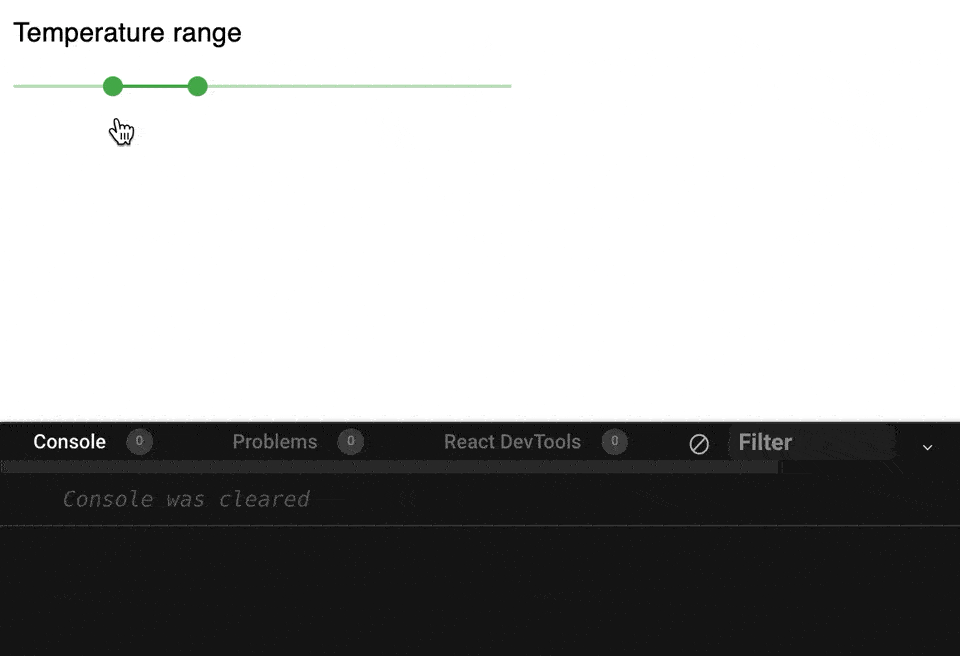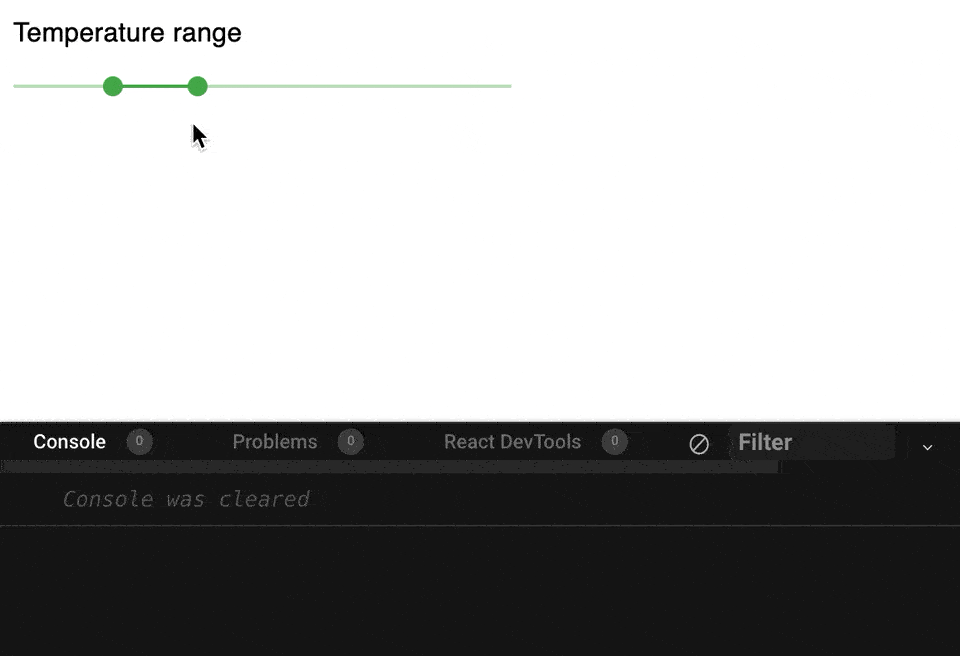Halo! Nama saya Igor Shamaev, saya adalah chief development engineer di tim SmartData. Saya terlibat dalam pengembangan full-stack dari sistem BI analitik internal. Di perusahaan kami, React diterima sebagai standar utama untuk membangun antarmuka pengguna. Seperti kebanyakan komunitas React, kami menggunakan hook secara ekstensif dalam pekerjaan sehari-hari.
Pembelajaran berkelanjutan merupakan bagian integral dari pekerjaan pengembang yang baik. Oleh karena itu, hari ini saya ingin memberikan kontribusi saya yang rendah hati untuk proses ini dan memberikan panduan kecil bagi mereka yang mulai secara aktif mempelajari React dan bekerja dengan hook. Dan di sepanjang jalan, berikan Anda alat kecil dan berguna untuk bekerja dengan standar React yang baru.
Dalam terjemahan artikel Debouncing dengan React Hooks, kita belajar bagaimana, tanpa pustaka pihak ketiga, hanya menggunakan kapabilitas React, Anda dapat membuat hook di beberapa baris kode untuk bekerja dengan perubahan lambat pada nilai variabel. Sekarang saya mengusulkan untuk mempertimbangkan hook berguna lainnya yang akan membantu kita menunda pemanggilan fungsi. Jika fungsi akan dipanggil berkali-kali berturut-turut, maka panggilan sebenarnya hanya akan terjadi setelah interval penundaan yang kita tetapkan. Artinya, hanya untuk panggilan terakhir dalam seri ini. Solusinya juga sangat ringkas dan mudah diterapkan di React. Jika Anda tertarik, silakan, di bawah kucing.

React . . , React , .
import { useRef, useEffect } from "react";
export default function useDebouncedFunction(func, delay, cleanUp = false) {
const timeoutRef = useRef();
function clearTimer() {
if (timeoutRef.current) {
clearTimeout(timeoutRef.current);
timeoutRef.current = undefined;
}
}
useEffect(() => (cleanUp ? clearTimer : undefined), [cleanUp]);
return (...args) => {
clearTimer();
timeoutRef.current = setTimeout(() => func(...args), delay);
};
}, - , . , . Material-UI.
import React from "react";
import { makeStyles, Typography, Slider } from "@material-ui/core";
import useDebouncedFunction from "./useDebouncedFunction";
import apiRequest from "./apiRequest";
const useStyles = makeStyles({
root: {
width: 300
}
});
function valuetext(value) {
return `${value}°C`;
}
export default function RangeSlider() {
const classes = useStyles();
const [value, setValue] = React.useState([20, 37]);
const handleChange = (event, newValue) => {
setValue(newValue);
};
return (
<div className={classes.root}>
<Typography id="range-slider" gutterBottom>
Temperature range
</Typography>
<Slider
value={value}
onChange={handleChange}
valueLabelDisplay="auto"
aria-labelledby="range-slider"
getAriaValueText={valuetext}
/>
</div>
);
}
, - , . , . , - , . , , console.log():
export default function valueLogging(value) {
console.log(`Request processed. Value: ${value}`);
} handleChange() valueLogging() , :
const handleChange = (event, newValue) => {
setValue(newValue);
valueLogging(newValue);
};
… , . valueLogging() . . . ?
1. useDebounce value .
useDebounce debouncedValue, . useEffect valueLogging(). - :
export default function RangeSlider() {
const classes = useStyles();
const [value, setValue] = React.useState([20, 37]);
const [changedByUser, setChangedByUser] = React.useState(false);
const debouncedValue = useDebounce(value, 300);
useEffect(() => {
if (changedByUser) {
valueLogging(debouncedValue);
}
}, [debouncedValue]);
const handleChange = (event, newValue) => {
setValue(newValue);
if (!changedByUser) {
setChangedByUser(true);
}
};
return (
<div className={classes.root}>
<Typography id="range-slider" gutterBottom>
Temperature range
</Typography>
<Slider
value={value}
onChange={handleChange}
valueLabelDisplay="auto"
aria-labelledby="range-slider"
getAriaValueText={valuetext}
/>
</div>
);
}, , ? , useEffect, , valueLogging() . , . , useEffect , valueLogging(). , React useEffect changedByUser. , .
?
2. valueLogging() handleChange().
, :
export default function RangeSlider() {
const classes = useStyles();
const [value, setValue] = React.useState([20, 37]);
const debouncedValueLogging = useDebouncedFunction(valueLogging, 300);
const handleChange = (event, newValue) => {
setValue(newValue);
debouncedValueLogging(newValue);
};
return (
<div className={classes.root}>
<Typography id="range-slider" gutterBottom>
Temperature range
</Typography>
<Slider
value={value}
onChange={handleChange}
valueLabelDisplay="auto"
aria-labelledby="range-slider"
getAriaValueText={valuetext}
/>
</div>
);
} useDebouncedFunction, .
React:
import { useRef } from "react";
export default function useDebouncedFunction(func, delay) {
const ref = useRef(null);
return (...args) => {
clearTimeout(ref.current);
ref.current = setTimeout(() => func(...args), delay);
};
} , . , . -, useRef ( useRef). : , React. -, . current .
, useRef, , DOM-. , . . setTimeout() . timeoutId, setTimeout(), ref.current. , useDebouncedFunction. timeoutId clearTimeout(). , . , valueLogging() 300 . .
let timeoutId; :
export default function useDebouncedFunction(func, delay) {
let timeoutId;
return (...args) => {
clearTimeout(timeoutId);
timeoutId = setTimeout(() => func(...args), delay);
};
}React. React . , , :

- , debouncedValueLogging() timeoutId. .
, :

! . , .
, . , - . . , , ?
, - . , , .
.
-, , value . , , RangeSlider .
import React, { useState } from "react";
import { ThemeProvider, createMuiTheme, Typography } from "@material-ui/core";
import RangeSlider from "./RangeSlider";
const theme = createMuiTheme({});
export default function App() {
const [sliderShown, setSliderShown] = useState(true);
//
function handleValueChange(value) {
if (value[1] === 100) {
setSliderShown(false);
}
}
return (
<ThemeProvider theme={theme}>
{sliderShown ? (
<RangeSlider onValueChange={handleValueChange} />
) : (
<Typography variant="h2">Too hot!</Typography>
)}
</ThemeProvider>
);
}-, RangeSlider , , , . , - , , , . .
import React from "react";
import { makeStyles, Typography, Slider } from "@material-ui/core";
import useDebouncedFunction from "./useDebouncedFunction";
import valueLogging from "./valueLogging";
import checkIfOptimal from "./checkIfOptimal";
const useStyles = makeStyles({
root: {
width: 300
}
});
function valuetext(value) {
return `${value}°C`;
}
export default function RangeSlider(props) {
const classes = useStyles();
const [value, setValue] = React.useState([20, 37]);
const [isOptimal, setIsOptimal] = React.useState(true);
//
const debouncedValueLogging = useDebouncedFunction(
newValue => valueLogging(newValue),
300
);
//
const debouncedValueCheck = useDebouncedFunction(
newValue => checkIfOptimal(newValue, setIsOptimal),
300
);
const handleChange = async (event, newValue) => {
setValue(newValue);
debouncedValueLogging(newValue);
debouncedValueCheck(newValue);
if (props.onValueChange) {
props.onValueChange(newValue);
}
};
return (
<div className={classes.root}>
<Typography id="range-slider" gutterBottom>
Temperature range
</Typography>
<Slider
value={value}
onChange={handleChange}
valueLabelDisplay="auto"
aria-labelledby="range-slider"
getAriaValueText={valuetext}
style={{ color: isOptimal ? "#4caf50" : "#f44336" }}
/>
</div>
);
}-, checkIfOptimal():
//
export default function checkIfOptimal(newValue, setIsOptimal) {
return setIsOptimal(10 < newValue[0] && newValue[1] < 80);
}, :

, , checkIfOptimal().

, React :
Warning: Can't perform a React state update on an unmounted component. This is a no-op, but it indicates a memory leak in your application. To fix, cancel all subscriptions and asynchronous tasks in a useEffect cleanup function.
in RangeSlider (at App.js:20)
? , true/false . setIsOptimal(). , 300 . . React. . ?
useDebouncedFunction: cleanUp. true, .
import { useRef, useEffect } from "react";
export default function useDebouncedFunction(func, delay, cleanUp = false) {
const timeoutRef = useRef();
//
function clearTimer() {
if (timeoutRef.current) {
clearTimeout(timeoutRef.current);
timeoutRef.current = undefined;
}
}
// , cleanUp true
//
useEffect(() => (cleanUp ? clearTimer : undefined), [cleanUp]);
return (...args) => {
clearTimer();
timeoutRef.current = setTimeout(() => func(...args), delay);
};
}useEffect, .clearTimer().
.
//
const debouncedValueCheck = useDebouncedFunction(
newValue => checkIfOptimal(newValue, setIsOptimal),
300,
true
);.

, . , .
?
, . checkIfOptimal() — , . checkIfOptimal() , , , .
? useDebouncedFunction , , , .
, .
. , .
, , codesandbox. :